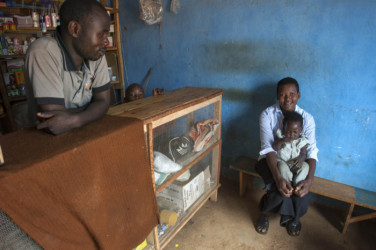
Meet Florida, the young mother saving to put her children through school
So often, beneficiaries in the developing world are reduced to cold numbers. But ask Florida Mukarugema what’s been the biggest change since she opened her shop and her answer won’t fit on any graph. “I am feeling happy. I am no longer crying.”
Florida joined a Village Savings and Loan group organised by Hand in Hand field partner CARE in 2009, driven, like so many others, by sheer desperation. “We used to eat just once a day, in the evening. We didn’t have our own home but stayed with others. I couldn’t even afford a bunch of bananas,” she says.
How things have changed. Today, bananas are Florida’s bestselling item, the staple around which the young mother built her growing business, which also sells rice, maize flour and more. Recently, with help from a Hand in Hand business trainer, she borrowed 108,000 Rwandan francs (US $158) to build a water facility and sell clean water. Tally her earnings from both and Florida’s annual income is 1,200,000 RWF (US $1,760), almost ten times what she made previously and three times the gross national income per capita.
A country rebuilds
Life in Rwanda has improved beyond description in the 20 years since genocide convulsed the country, claiming some 800,000 lives in just 100 days. The economy is growing at upwards of 8 percent a year. Rwanda was- “top-performing” at the Millennium Development Goals, according to the UN. Social progress, evinced by the world’s greatest proportion of women MPs – 64 percent – has been undeniable. And yet there remains a hugely long way to go.
Florida’s neighborhood
Rural Rwanda, home to Florida’s Eastern Province village of Kinamba, experiences three times more poverty than urban Rwanda. Countrywide, more than 80 percent of Rwandans are engaged in agriculture, many at the subsistence level. And almost a third of Rwandans are considered undernourished by the International Food Policy Research Institute.
Savings and loans
Florida was one of them. Then she borrowed 15,000 RWF (US $22) from her Village Savings and Loan group and bought three bundles of bananas, which quickly sold for 28,000 RWF (US $41). Buoyed by a series of ever-bigger successes, Florida went on to borrow 200,000 RWF (US $294) from her group to open a shop.

“Before I joined the group I was not even able to buy salt,” she says. “I did not know how to use the bank and I did not understand how to buy and sell and make a profit.”
Today, Florida, her husband and the couple’s four children – two of whom are adopted – live in a furnished three-room home with clean water. “I will make sure they go to university and then live in a nice place,” she says.
Florida’s results
Annual income of 1,200,000 RWF (US $1,760) – 10 times her previous income
200,000 RWF (US $290) in savings
Saving to pay for children’s university fees
Hand in Hand Eastern Africa and CARE Rwanda are co-operating to empower some 100,000 Rwandans, mostly women, to work their way out of poverty by running their own sustainable businesses. The three-year, US $3.2 million partnership is grounded in our shared belief in the power of entrepreneurship to fight poverty.
Next case study: Meet Gloria, the former refugee growing crops – and profits
